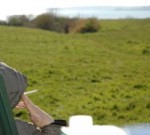Her head still bent, her skinny and hunched blue-jacketed shoulders heaving, my mother on the Windsor chair that Christmas Eve did not seem to be getting any better. “I think you should go to the emergency room,” I said. “It’s just 10 minutes from here, a zip down the freeway.”
My mother looked up at me. “Maybe I should go,” she said. My sense of alarm quickened; stricken though she was, I had expected my mother to shrug off the need for medical care with her customary “oh, pfft, I’ll be OK.” But now she looked up at my father, who was standing silently a few feet away, his hands in his pockets. He looked bored; his head was turned slightly toward the counter, and I realized with incredudlity that he was scanning an environmental magazine A.’s nephew had left out on the counter.
“What do you think?” my mother asked him. “Dad?” I said. He swiveled his head toward where I stood, my hand on my mother’s heaving shoulders. “Should I go to the emergency room?” my mother asked him again. Her breaths were coming in tortured half-pants; she was deathly pale and had begun to perspire heavily. She seemed scared. I thought of a heart attack, glanced toward the phone: 911?
“What do you think?” my mother asked my father again. “I think you need to go,” I interjected. “I’ll drive if you want.”
“Maybe I should,” my mother agreed—gratefully, I thought. Then, again addressing my father: “I don’t know, should I?” He shrugged. “If that’s what you want,” he said finally; his tone was mostly indifferent, but a current of impatience ran through it. Then to me, while gesturing toward the magazine: “Say, could I get a copy of this?”
Nonplussed doesn’t begin to describe what I felt. I looked at A., whose jaw had dropped, and then at my mother, whose eyes evoked those of a frightened deer. “You’re going, Mom,” I said. “Let’s call an ambulance,” A. suggested, with a meaningful eye roll toward my father. “No,” my mother said. She struggled to her feet. “I think I can make it to the car.”
That was the start. Everything that came afterward was augured in the kitchen that night: Not only my mother’s incommutable turn toward terminal illness, but also just how arduous and bizarre and heartbreaking her final three years would be. The twisted dynamics between my mother and father and how they would increasingly imperil my mother’s well-being. Her dependence and fear and need; his clueless inadequacy and his resentment; my alarmed and stumbling attempts to intervene.
My mother panting in a corner while my father scanned a magazine; he was, and would remain, the relentlessly stolid axis around which everything revolved, the stumbling stone on which everything foundered; his disconcerting “if that’s what you want,” with its edgy indifference, would prove to be as good as it got with him.
All the makings were there in that moment for what would play out, as her needs steadily grew and his limitations and resentments bloomed apace, as something akin to a hostage drama.
That night, my mother and father did proceed to the hospital, where—as I later learned—my father deposited my mother at the first hospital door he saw, miles from the ER, while he drove off to a parking ramp. In the unattended lobby, my dizzy, gasping mother was so confused and panicked that tears blurred her eyes and she lost control of her bladder. Thankfully, a passing doctor soon found the distressed heap crumpled in a puddle—my mother—and in short order she was flying to the ER on a gurney.
I waited by the phone; I had asked my father to call as soon as he knew anything. “Am I going to lose my mother?” I asked A, noticing the quake in my voice. “I’m not ready,” I said. When the phone hadn’t rung by a little after midnight, I tried my father at home. He answered after seven rings. “Hello?” he said sleepily. “I’ve been waiting for you to call,” I said. “You have? About what?” he answered.
My mother had been admitted to the hospital; my father said he hadn’t a clue why. “I think they just want to watch her,” he offered. The next morning, A. and I sped to the hospital early, hoping to catch a doctor on morning rounds. We were in luck: We stepped off the elevator on my mother’s floor to bump almost literally into Dr. J., an attending physician who’d just come from my mother’s bedside. “How is she?” I asked him, urgently.
“Well, as you know, her COPD is very advanced,” he told me with a look of grave concern. He was tall, long-faced, soft-spoken; he spoke with what I thought was a West Indian accent.
“Her COPD,” I repeated dumbly.
“Chronic obstructive pulmonary disease,” he said. He looked at me in puzzlement. “Your mother’s emphysema. It’s very bad.”
I felt shocked. My mother’s emphysema—! In the same heartbeat, everything focused sharply and then fell apart. My God, I thought. My mother’s breathlessless last summer. Her dismissive shrug, minutes after stubbing out a cigarette, in mentioning “a touch of emphysema”; not a big deal, she’d said, pointing out the magic powder in her purse. Her repeats of bronchitis and pneumonia, the hospitalizations.
I knew little of respiratory disease. But how naive I’d been, I thought; stupid, even. But then, I didn’t see my mother that much, I reminded myself. A fact that of course offered no consolation, only a slamming sense of guilt.
Another pang: The Christmas Eve at our house the night before–! It’s no wonder her failing lungs had gone to pieces. That crackling fire in our fireplace, the candles burning in the kitchen, all those curls of wafting smoke. The cold porch, her shivering out there with her cigarette and glass of pinot grigio. The steep stairway schlep to and from the bathroom.
But I hadn’t known. She’d seemed tired, true; everytime I saw her she looked smaller and more stooped. Her voice was hoarse; yet another “little bronchitis,” she said; her doctor had given her Zithromax. But she was bright and sociable, as always, hauling in a sack of presents and a foil-packed rectangle of store-bought brownies, interested in everyone, mingling, intrepidly sampling unfamiliar tapenades and exotic cheeses; such a vibrant contrast to the glum husband frowning uncomprehendingly at bruschetta and sittingly in lumpen silence in an armchair near the fire.
And there, too, was my mother heading to the porch, her cigarettes and her Bic lighter, her glass of wine, and her tiny traveling ashtray with the silver lid that snapped closed over her lipsticked butts …
What, then of her own apparent innocence? Was it denial, her old friend? Or genuine ignorance? Her mind already had begun to slip; she forgot things, seemed to lose her way easily, had become so addled and agitated while playing Spit in the Ocean the previous spring, during a rare evening at our house, that A. and I proposed we throw in the cards and bring on dessert. Maybe she hadn’t actually been able to retain her doctor’s diagnosis, or to make sense of it.
Another possibility presented itself: That it simply hadn’t been possible for my mother to go there. Her husband, axis and stumbling block. Rationalist to an irrational extreme. He had no use for illness; it’s in your head; just don’t think about it. What’s in your head is real. Illness is not. He’d embarrassed and infuriated my mother by suggesting to her terminally ill brother, struck down at 60 by a brain tumor, that he might get right to the business of snapping out of it. Just read Norman Cousins, he said, in his earnest and superior way, though presumably he thought himself helpful.
I flashed on the previous summer, my mother gasping beside me on a bench: “We’d better catch up; he’s getting annoyed,” my mother had said with a nod toward the car where my father sat with the motor running. Yikes, I thought suddenly: My father was probably at home at this very moment loading up the RV. He and my mother were supposed to head off to the Southwest tomorrow—though my mother made it abundantly clear she’d had enough of snowbirding in a Winnebago. And of course was going nowhere now, no matter how much he willed it.
But the wreck of my mother’s lungs. Whatever my mother had made or failed to make of her pulmonary prognosis, how had her primary care doctor failed to intervene in this catastrophe? Here was Dr. J., this hospital staff doctor who’d just met my mother, declaring a full orange alert: I listened as he explained that my mother’s severely impaired lungs had all but caused her heart to fail last night, that he’d immediately hooked her to supplemental oxygen, ordered drugs, affixed a nicotine patch; that another cigarette could be the death of her; that she would have to change her life whole cloth, be on oxygen 24 hours a day, follow a regimen of medications and nebulizer treatments.
They’d soon know more from a CT scan, Dr. J. said. I was scribbling notes furiously in the margins of my checkbook, my fumbling fingers having failed to find a notebook in my purse. My mother certainly didn’t have bronchitis, he added; he couldn’t fathom why her regular doctor had given her Zithromax. My mother was profoundly weak, he emphasized; this episode—a COPD exacerbation, he called it—was extremely serious. She needed to remain in the hospital for several days. And in any event, Dr. J. absolutely would not discharge my mother without oxygen tanks and a rock-solid care plan. He had summoned social services to arrange a family consult. “This is an intervention,” he said. “It’s her only chance.”
He wrapped up by stressing that “there is so very, very little left to your mother’s lungs. It’s amazing she is still walking around.” How is it, I thought again, that her regular doctor, Dr. L.—an internist my mother always referred to as “breezy Carol”—would not have acted with a similar sense of emergency? Breezy or not, she was a doctor, for chrissake, and here was her very own patient with “very, very little left of her lungs.” How had she let my mother go home without an oxygen tank—with only those packets of powdery Advair to tuck away next to her cigarettes?
Were we in malpractice territory? Dr. J.’s wonderment that breezy Carol had diagnosed bronchitis, “when what she needs is oxygen, her lungs are starved for it.”
But now. Focus. What now? I called my younger sister, who had been waiting for news; she promised to get to the hospital as soon as she and her 9-year-old daughter had finished rolling out gingerbread. I looked at A., who shook her head. We went in then to my mother, the bright candle of her now a spent wick in a hospital gown. Her nostrils sported slender oxygen tubes. Her face lit up the moment she saw me, but she was weak and confused. “How did I end up here?” she asked me. My heart swelled with love, fearsome and fearful.
In the hallway, I phoned my father—better put him in the picture right away, I thought. Dr. J.’s sobering prognosis would, after all, be nearly as life-altering for him as it was for my mother.
“I see,” he replied noncommitally after I’d filled him in. “That’s very interesting. Thank you for letting me know.” His exact words; I remember them with searing clarity. I was speechless for a few moments. Across the hallway, I could see Dr. J. standing outside my mother’s room with a woman whose kindly countenance and manila folder suggested a social worker. Dr. J.’s slender fingers motioned to me. “Are you coming to see her?” I said finally into the phone.
“I hadn’t planned to,” my father said. “I’ve got a lot of packing to do.”
This is a true story. It was Christmas Day, 2005. That was the start. Even considering the many mountains that lay ahead, it was all downhill from there.









 She dressed only to please herself, to be sure, having taken in few fashion cues, or clues, in several decades. Her ideas of style seemed to harken back to 1960, to a time when sleek plaid slacks were just the thing for getting together for bridge, mixing a cocktail, trying the twist. But you could see the effort she made, mixing and matching those slack-and-jacket ensembles into her eighties. The gulf between her and Naomi Campbell was clearly vast; she seemed from a different millenium and galaxy than the women of, say, Project Runway. But she was always tasteful and on her own terms, coordinated; black or navy slacks on the bottom, white blouse or turtleneck on top, rarely chancing a pattern bolder than a calico, sticking mostly to safe tweeds and burgundies (and the odd red, in which she looked radiant). She always took the trouble to accessorize. If the overall effect–especially on her tiny and increasingly stooped body–tended to kitsch, it was also true that she was occasionally darling.
She dressed only to please herself, to be sure, having taken in few fashion cues, or clues, in several decades. Her ideas of style seemed to harken back to 1960, to a time when sleek plaid slacks were just the thing for getting together for bridge, mixing a cocktail, trying the twist. But you could see the effort she made, mixing and matching those slack-and-jacket ensembles into her eighties. The gulf between her and Naomi Campbell was clearly vast; she seemed from a different millenium and galaxy than the women of, say, Project Runway. But she was always tasteful and on her own terms, coordinated; black or navy slacks on the bottom, white blouse or turtleneck on top, rarely chancing a pattern bolder than a calico, sticking mostly to safe tweeds and burgundies (and the odd red, in which she looked radiant). She always took the trouble to accessorize. If the overall effect–especially on her tiny and increasingly stooped body–tended to kitsch, it was also true that she was occasionally darling.